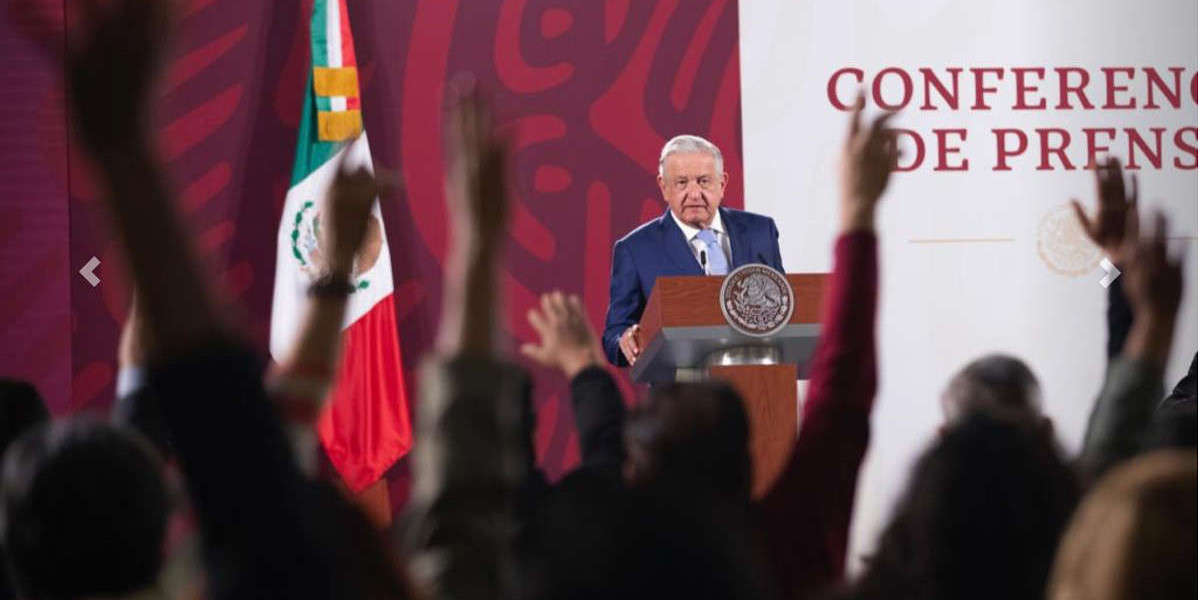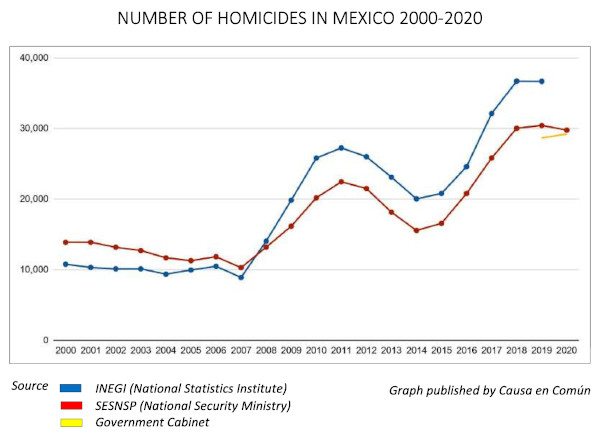In the image
President López Obrador during one of his early morning press conferences, known as 'Las mañaneras' [Mexico Gov.]
The systematic murder of journalists in Mexico began two decades ago as a result of the rise of organised crime. Since then, the country has been plunged into a spiral of violence against journalists that has gone through many tragic moments with more than 150 journalists murdered since the year 2000. According to Reporters Without Borders, Mexico is one of the most dangerous countries in the world to practice journalism.
The three years of Andrés Manuel López Obrador (AMLO) as Mexico's president have been the most violent period against Mexican journalists on record. Article 19, a civil organisation that defends freedom of the press, has recorded 36 murders during AMLO's mandate, 50% more homicides compared to the previous governments of Felipe Calderón (2006-2012) and Enrique Peña Nieto (2012-2018), when 26 and 19 journalists, respectively, were murdered in their first three years. Article 19 highlights that there have been 1,945 attacks against the press since AMLO is president, 85% more attacks.
The past 9th of May, unions and journalistic groups had called for a mobilisation in twenty cities throughout the country to protest the murder of reporter Luis Enrique Ramírez, which had occurred the week before, when they received the tragic news that two colleagues had just been shot in Veracruz. Protesters had to paint new signs to include the names of Yessenia Mollinedo and Johana García on the list of 11 journalists killed in Mexico so far this year, which means that on average now, a journalist is murdered every 10 days in Mexico.
Besides the security crisis, the rhetoric of the President López Obrador towards journalists has been very polemic, as it represents another serious challenge that journalists must face. In fact, it is believed that his position has actively contributed to the intensification of their vulnerability. The European Parliament passed a resolution on March 10th that condemned the killings of journalists in Mexico and denounced the "populist rhetoric" of the president. As a matter of fact, Mexico's government blamed the "slanderous" European resolution on conservative politicians "with a colonialist mindset". The People's Tribunal on the Murder of Journalists, a project organised by Reporters Without Borders and Free Press Unlimited, has pointed to state failures to protect journalists. Emmanuel Colombié, director of Reporters Without Borders in Latin America, explained at the end of April: "We want to show that the Mexican authorities have failed in their mission to protect journalists".
The president's controversial remarks
President López Obrador assumed power at the end of 2018 with the promise of pacifying the country and blaming the former presidents for the insecurity issues the country was facing. However, he recognised challenges when containing homicides, witnessing a record during his first year of presidency in 2019 with 34,600 homicides. In the following years, the number of homicides slightly decreased but still remains in a very high level.
Before becoming president, he announced in his campaign that if he was ever elected, he would introduce daily morning conferences in the National Palace known as 'Las mañaneras' to talk to press, engage with his audience in freewheeling discussions and outline political plans. He implemented them in December 2018, and as a matter of fact, three years performing "Las mañaneras" since December 2018 to December 2021 have had an estimated cost of at least 1.5 million euros (30 million Mexican pesos).
On the one hand, these briefings are perceived as a meritorious political strategy for a country where its leaders have usually been perceived as distant and arrogant. On the other hand, there is great controversy around them, as in these conferences the president also excoriates neoliberalism, rebuts "fake news" and talks about journalists in a divisive "us versus them" approach that recalls the former US President Donald Trump, with whom he rarely otherwise agreed. Journalists have been called "defenders of interest groups," "neoliberals" and "mercenaries" when opposing to AMLO's ideas.
On February 22nd he stressed that journalists "are allied with a conservative bloc, the purpose is to harm us (...) there is a lack of ethics in journalism". Ten days before, on February 11th he discredited Carlos Loret de Mola in a conference by publicly speculating about his income, which was qualified on social networks as an excessive attack of revenge for the investigation he carried out about an oil company that rented a house to the president's son in Texas. Carlos Loret de Mola concluded in an interview that "While he says that his government does not persecute any journalist, within a few minutes, he slanders me and reveals staff data for investigating the luxuries of his son... AMLO has his sights set on me".
Jan-Albert Hootsen, the Mexican representative of the Committee to Protect Journalists said after the European Union passed the resolution that "Mexican journalists are calling for change, and the European Parliament has supported them in their calls. At best, President López Obrador has consistently shown that press freedom is not a priority for him, and at worse he has openly vilified journalists. This resolution must now be part of a concerted move for change, with the EU working in solidarity with journalists on the ground".


